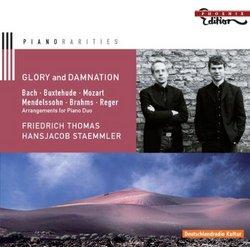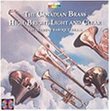| All Artists: Johann Sebastian Bach, Jan Pieterszoon Sweelinck, Dietrich Buxtehude, Wolfgang Amadeus Mozart, Felix [1] Mendelssohn, Johannes Brahms, Max Reger, Friedrich Thomas, Hans Jacob Staemmler Title: Glory and Damnation Members Wishing: 0 Total Copies: 0 Label: Phoenix Edition Original Release Date: 1/1/2008 Re-Release Date: 10/28/2008 Genres: Pop, Classical Styles: Vocal Pop, Opera & Classical Vocal, Chamber Music, Forms & Genres, Variations, Historical Periods, Baroque (c.1600-1750), Classical (c.1770-1830), Renaissance (c.1450-1600) Number of Discs: 1 SwapaCD Credits: 1 UPC: 811691011349 |
Search - Johann Sebastian Bach, Jan Pieterszoon Sweelinck, Dietrich Buxtehude :: Glory and Damnation
 | Johann Sebastian Bach, Jan Pieterszoon Sweelinck, Dietrich Buxtehude Glory and Damnation Genres: Pop, Classical |
Larger Image |
CD DetailsSimilarly Requested CDs |
CD Reviews'Glory and Damnation': Extremely Effective Arrangements for J Scott Morrison | Middlebury VT, USA | 12/02/2008 (5 out of 5 stars) "This CD is a collection of arrangements by Heribert Breuer for piano duo of organ works, briefly interrupted in the middle by a couple of arrangements of Mozart orchestral/choral works. Breuer, a former student of Helmut Rilling and Bernd Alois Zimmermann, is director of the Berlin Bach Academy. The performers are a couple of thirty-ish German pianists, Friedrich Thomas and Hansjacob Staemmler, who formed a piano duo in 2004. Each is a professor of piano at a German institution -- Thomas in Dresden, Staemmler in Berlin.
The program, almost all of it in minor keys, starts off with one of the most familiar of Bach's organ works, the great C Minor Passacaglia BWV 582. It is given a noble interpretation. Then comes Sweelinck's Variations on 'Mein junges Leben hat ein End' ('My young life has an end'). Buxtehude is represented by two works: the 1674 'Trauermusik' ('Funeral Music', written at the time of his father's death) and the Prelude and Fugue in G Minor. As you can see, there is a theme here: that earthly lives must end and presumably reap either 'Glory' or 'Damnation', hence the title of this CD. The centerpiece of the program are two works by Mozart: his 'Masonic Funeral Music', K477, and an arrangement of the hieratic Chorale of the Armored Men from 'The Magic Flute', whose text includes these words: 'if he can overcome the fear of death he will ascend from earth to heaven'. Proceeding chronologically, we come to Mendelssohn's Prelude and Fugue in D Minor, Op. 37 which sounds for all the world like a baroque work, no surprise since Mendelssohn was a Bach scholar who, among other things, revived the St. Matthew Passion for 19th century music lovers. The final two works are an arrangement of Brahms's chorale-overture for organ, 'O Welt ich muss dich lassen' ('O World, I must leave you', based on an anonymous chorale from the 16th century) and, in a sort of symmetry with the opening Bach passacaglia, Reger's magnificent Introduction and Passacaglia in F Minor, Op. 63. The arrangements are respectful of their sources and have been translated successfully to the piano duo format. The performers are musically satisfying. The piano they use is beautifully regulated and voiced; not surprisingly, given the frequency of important bass lines, the secondo player -- we are not told which performer is which -- takes care to coax beautiful rounded tones from the instrument's lower regions. The notes for this issue are poorly translated from the German, but the latter is itself filled with twaddle and best ignored. Still, this issue gets a strong recommendation for the beauty of the arrangements and of the performances. Scott Morrison" |










